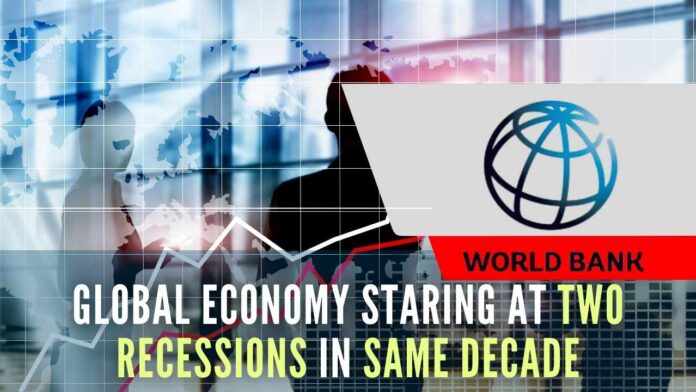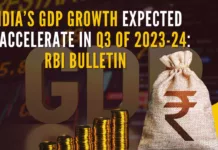
For the first time in 80 years, global recessions have occurred within the same decade
According to the World Bank’s latest Global Economic Prospects report, global growth is slowing sharply in the face of elevated inflation, higher interest rates, reduced investment, and disruptions caused by Russia’s invasion of Ukraine.
This would mark the first time in more than 80 years that two global recessions have occurred within the same decade, the World Bank said.
Given the fragile economic conditions, any new adverse development — such as higher-than-expected inflation, an abrupt rise in interest rates to contain it, a resurgence of the COVID-19 pandemic, or escalating geopolitical tensions — could push the global economy into recession.
The global economy is projected to grow by 1.7 percent in 2023 and 2.7 percent in 2024. The sharp downturn in growth is expected to be widespread, with forecasts in 2023 revised down for 95 percent of advanced economies and nearly 70 percent of emerging markets and developing economies.
“The crisis facing development is intensifying as the global growth outlook deteriorates,” said World Bank Group President David Malpass.
“Emerging and developing countries are facing a multi-year period of slow growth driven by heavy debt burdens and weak investment as global capital is absorbed by advanced economies faced with extremely high government debt levels and rising interest rates. Weakness in growth and business investment will compound the already-devastating reversals in education, health, poverty, and infrastructure and the increasing demands from climate change.”
In the US, growth is forecast to fall to 0.5 percent in 2023 — 1.9 percentage points below previous forecasts and the weakest performance outside of official recessions since 1970.
In 2023, euro-area growth is expected at zero percent — a downward revision of 1.9 percentage points. In China, growth is projected at 4.3 percent in 2023, 0.9 percentage points below previous forecasts.
Excluding China, growth in emerging markets and developing economies is expected to decelerate from 3.8 percent in 2022 to 2.7 percent in 2023, reflecting significantly weaker external demand compounded by high inflation, currency depreciation, tighter financing conditions, and other domestic headwinds.
The report offers the first comprehensive assessment of the medium-term outlook for investment growth in emerging markets and developing economies. Over the 2022-2024 period, gross investment in these economies is likely to grow by about 3.5 percent on average – less than half the rate that prevailed in the previous two decades.
[With Inputs from IANS]
PGurus is now on Telegram. Click here to join our channel and stay updated with all the latest news and views
For all the latest updates, download PGurus App.
- PM Modi launches another scathing attack on Congress; says ‘Rajiv Gandhi scrapped inheritance law to save family property’ - April 25, 2024
- TN: ED questions five district collectors in illegal sand mining case - April 25, 2024
- ECI issues show cause notice over alleged MCC violations by PM Modi, Rahul Gandhi; seeks response from BJP, Congress chief - April 25, 2024











The recessions have been caused by the Federal Reserve Bank . The earlier recession was caused by printing dollars without adequate gold which had to be corrected by FDR banning and confiscating gold from Americans in 1933.
The present recession again has been caused by limitless printing without a gold backing by the Fed.
Very few people remember the words on a note
I promise to pay the bearer on demand
Then :
I promise to pay the bearer
Now
This note is legal tender for all debts.
What one holds is the worthless IOU called currency in their pocket or bank accounts.
Memory is short. Brains or application of brains is woefully absent.
Will common sense and application of brian save our future and souls. Remember the people who print will always have the advantage .
Pakistan is developing very fast & its economy is booming when world is in gloom. Pakistan is the future of the world. Every country is investing in it. In one single day it got US$ 9 billion commitment
Unfortunately, for it 75 years of global warming has devastated them. West is accountable for that destruction & should pay it in hard cash immediately.